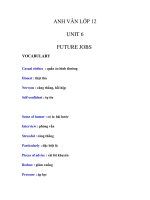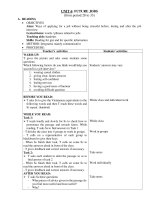Unit 6 Future jobs E Languague focus
Bạn đang xem bản rút gọn của tài liệu. Xem và tải ngay bản đầy đủ của tài liệu tại đây (1.92 MB, 24 trang )
<span class='text_page_counter'>(1)</span><div class='page_container' data-page=1></div>
<span class='text_page_counter'>(2)</span><div class='page_container' data-page=2></div>
<span class='text_page_counter'>(3)</span><div class='page_container' data-page=3>
<b>I. Pronunciation:</b>
<b>Weak and strong forms of some </b>
<b>conjunctions and prepositions</b>
<b>II. Grammar:</b>
</div>
<span class='text_page_counter'>(4)</span><div class='page_container' data-page=4>
<b>I. PRONUNCIATION</b>
</div>
<span class='text_page_counter'>(5)</span><div class='page_container' data-page=5>
<b>Listen and repeat</b>
<b>Conjunctions</b>
<b>Strong form</b>
<b>and </b>
<b>but</b>
<b>[ænd]</b>
<b>[bʌt]</b>
<b>[ənd, ən]</b>
<b> [bət]</b>
</div>
<span class='text_page_counter'>(6)</span><div class='page_container' data-page=6></div>
<span class='text_page_counter'>(7)</span><div class='page_container' data-page=7>
<b>Practice reading </b>
<b>these sentences</b>
<b>1. What are you looking at?</b>
</div>
<span class='text_page_counter'>(8)</span><div class='page_container' data-page=8>
<b>3. She bought a book and two pens.</b>
<b> 4. Thanks for coming.</b>
<b> 5. I’m from Hanoi</b>
<b> 6. Where is it from?</b>
<b> 7. She’s the one I’m fond of.</b>
<b> 8. First of all, I want to thank you for coming.</b>
<b> 9. The letter was to him, not from him.</b>
</div>
<span class='text_page_counter'>(9)</span><div class='page_container' data-page=9>
<b>II. GRAMMAR</b>
</div>
<span class='text_page_counter'>(10)</span><div class='page_container' data-page=10>
<b>RELATIVE CLAUSES</b>
<b>GENERAL RULES</b>
:
<b>Subject</b>
<b>Object </b>
<b>Possessive</b>
<b>who</b>
<b>whom (</b>
<b>who)</b>
<b>whose</b>
<b>which</b>
<b>which</b>
<b>whose, of which</b>
<b>Things and </b>
<b>Animals</b>
<b>Persons</b>
</div>
<span class='text_page_counter'>(11)</span><div class='page_container' data-page=11>
<b>EXAMPLES</b>
:
<b>WHO</b>
- Do you know the man? He wrote this poem.
<sub>Do you know the man </sub>
<i><b><sub>who </sub></b></i>
<sub>wrote</sub>
<sub> this poem?</sub>
(
WHO
: subject of
WROTE
)
<b>WHOM (WHO)</b>
- My employer works in the next room. I dislike
him.
<sub> My employer, </sub>
<i><b><sub>whom</sub></b></i>
<sub> I </sub>
<sub>dislike</sub>
<sub>, works in the </sub>
next room.
</div>
<span class='text_page_counter'>(12)</span><div class='page_container' data-page=12>
<b>WHICH</b>
- The flowers are beautiful. You bought the
flowers yesterday.
<sub>The flowers </sub>
<i><b><sub>which</sub></b></i>
<sub> you </sub>
<sub>bought are beautiful </sub>
yesterday.
(
WHICH
: object of BOUGHT)
- The flowers are beautiful. The flowers are in
your garden.
<sub>The flowers </sub>
<i><b><sub>which</sub></b></i>
<sub>are in your garden are </sub>
</div>
<span class='text_page_counter'>(13)</span><div class='page_container' data-page=13>
<b>WHOSE</b>
- I know the girl. Her father works in this bank.
<sub> I know the girl </sub>
<i><b><sub>whose</sub></b></i>
<sub> father works in this b</sub>
<sub>ank</sub>
<sub>.</sub>
- A tree should be cut down. Its branches are dead.
A tree
<i><b>whose</b></i>
branches are dead should be cut
down.
</div>
<span class='text_page_counter'>(14)</span><div class='page_container' data-page=14>
<b>THAT</b>
<b>may replace </b>
<i><b>who, whom, which</b></i>
<b> in </b>
<i><b>restrictive (defining) </b></i>
<i><b>clause</b></i>
<b>.</b>
<b> ex: - This is the girl </b>
<i><b>whom (that)</b></i>
<b> I want to marry.</b>
<b> - The flowers </b>
<i><b>which (that)</b></i>
<b> you bought are fresh.</b>
<b> - Do you know the man </b>
<i><b>who (that)</b></i>
<b> wrote this poem?</b>
<b> should be used after a mixed antecedent (person + thing </b>
<b>/ animal)</b>
<b> ex: I met the people, cattle and vehicles </b>
<i><b>that</b></i>
<b> went to </b>
<b>market.</b>
<b> should be used after adj. in the superlative and </b>
<i><b>“the </b></i>
<i><b>first”, “the last”, “the only”, “the very”</b></i>
</div>
<span class='text_page_counter'>(15)</span><div class='page_container' data-page=15>
<b>THAT</b>
<b> should be used after most </b>
<i><b>Indefinite </b></i>
<i><b>Pronouns</b></i>
<b>: </b>
<i><b>All, much, nothing, anything, </b></i>
<i><b>nobody, everything</b></i>
<i><b>,</b></i>
<b> ex: - Have you got all </b>
<i><b>that</b></i>
<b>you need ?</b>
<b> - I love everything </b>
<i><b>that</b></i>
<b> she makes for me.</b>
<b> - Much </b>
<i><b>that</b></i>
<b> I have read is untrue.</b>
<b> should be used after the opening IT </b>
<b>IS/WAS…, </b>
<b>(Cleft sentence)</b>
</div>
<span class='text_page_counter'>(16)</span><div class='page_container' data-page=16>
<b> </b>
<b>NOTES:</b>
<b>“</b>
<b>That</b>
<b>” is NOT used in </b>
<i><b>non-restrictive (non-defining) </b></i>
<i><b>clauses</b></i>
<b> (after the </b>
<i><b>comma</b></i>
<b>) or after </b>
<i><b>Prepositions</b></i>
<b> ex: - Air, </b>
<i><b>which</b></i>
<b>(that)</b>
<b> we breathe, is made up of </b>
<b>many gases.</b>
<b> - The man </b>
<i><b>to whom</b></i>
<b>(that)</b>
<b> you were talking is </b>
<b>the manager</b>
<i><b>Whom, which, that</b></i>
<b>are usually omitted from </b>
<i><b>restrictive clauses</b></i>
<b>when they are the </b>
<b>Object</b>
<b>of the </b>
<b>verb in the clause, or of a </b>
<i><b>preposition</b></i>
<b> that doesn’t </b>
<b>stand before them.</b>
</div>
<span class='text_page_counter'>(17)</span><div class='page_container' data-page=17>
<b>Whoever, whatever, …</b>
<b>: may be used as S, O</b>
<b>1. Whoever asks, don’t say I’m at home.</b>
<b>2. Whatever happens, be calm.</b>
<b>Which</b>
<b>: </b>
<b>may be used as S in </b>
<b> coordinating relative clauses</b>
<b>3. She gets good marks. This makes her </b>
<b>parents happy</b>
<b>3.</b>
<b>She gets goods marks, </b>
<b>which</b>
</div>
<span class='text_page_counter'>(18)</span><div class='page_container' data-page=18>
<b>Exercises</b>
</div>
<span class='text_page_counter'>(19)</span><div class='page_container' data-page=19>
<b>Exercise 1: </b>
<b>Add </b>
<i><b>Who, whoever, whose, whom, </b></i>
<i><b>or which</b></i>
to complete the following sentences
<b>1. There is one person to ___________ I owe </b>
<b>more than I can say.</b>
<b>2. It was the kind of accident for ___________ </b>
<b>nobody was really to blame.</b>
<b>3. ___________ leaves last should turn off the </b>
<b>lights.</b>
</div>
<span class='text_page_counter'>(20)</span><div class='page_container' data-page=20>
<b>5. At 6.00pm, ___________ was an hour before </b>
<b>the plane was due, thick for descended.</b>
<b>6. I don’t know ___________ told you that, but </b>
<b>they were wrong.</b>
<b>7. Mr. Brown was the first owner __________ </b>
<b>dog won three prizes in the same show.</b>
<b>8. I’ve just spoken to Sally, ___________ sends </b>
<b>you her love.</b>
<b>9. On Sunday, ___________ was my birthday, </b>
<b>we went out for a meal.</b>
</div>
<span class='text_page_counter'>(21)</span><div class='page_container' data-page=21>
<b>Exercise 2: Join the following sentences in two ways</b>
<b>Example: </b>
<b> Look at the man. He is teaching in the classroom.</b>
<i><b>Look at the man </b></i>
<i><b>who is</b></i>
<i><b> teaching in the classroom.</b></i>
<i><b>Look at the man </b></i>
<i><b>teaching</b></i>
<i><b> in the classroom.</b></i>
<b>1. I read a book. It was written by a friend of mine.</b>
<b>I read a book </b>
<b>which was written</b>
<b> by a friend of mine.</b>
<b>I read a book </b>
<b>written</b>
<b> by a friend of mine.</b>
<b>2. A man got on the bus. He was carrying a lot of money in a </b>
<b>box.</b>
<b>A man </b>
<b>who</b>
<b> got on the bus </b>
<b>was carrying</b>
<b> a lot of money in </b>
<b>a box.</b>
</div>
<span class='text_page_counter'>(22)</span><div class='page_container' data-page=22>
<b>3. In the street there were several people. They were waiting for the shop to </b>
<b>open.</b>
<b>……….</b>
<b>4. Britain imports many cars. They were made in Japan.</b>
<b>………</b>
<b>5. There are a lot of people in your office. They want to talk to you.</b>
<b>……….</b>
<b>6. The cowboy fell of his horse. He had been wounded by an arrow.</b>
<b>……….</b>
<b>7. Most of the people recovered quickly. They were injured in the crash.</b>
<b>……….</b>
<b>8. John looked anxiously at his watch. He wished he hadn’t come to the party.</b>
<b>……….</b>
</div>
<span class='text_page_counter'>(23)</span><div class='page_container' data-page=23>
<b>I. Pronunciation:</b>
<b> Weak and strong forms of </b>
<b>conjunctions: </b>
<i><b>and, but</b></i>
<b>prepositions: </b>
<i><b>at, for, of, to, from</b></i>
<b>II. Grammar:</b>
</div>
<span class='text_page_counter'>(24)</span><div class='page_container' data-page=24></div>
<!--links-->









